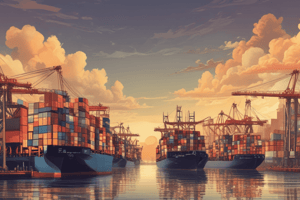Podcast
Questions and Answers
What is the main benefit of using comparative advantage in international trade?
What is the main benefit of using comparative advantage in international trade?
- Reducing the trade deficit
- Eliminating the use of labor
- Producing more wheat than rice
- Increasing gains from trade for two or more nations (correct)
What is the difference between absolute advantage and comparative advantage?
What is the difference between absolute advantage and comparative advantage?
- Comparative advantage is only used in international trade
- Absolute advantage is better than comparative advantage
- Absolute advantage refers to producing more quantity, while comparative advantage refers to producing at a lower opportunity cost (correct)
- Absolute advantage is used in domestic trade, while comparative advantage is used in international trade
According to the table, which country has an absolute advantage in the production of wheat?
According to the table, which country has an absolute advantage in the production of wheat?
- Both the United States and China
- United States (correct)
- It cannot be determined from the data
- China
What is the term for a situation in which one country has an absolute advantage in two goods?
What is the term for a situation in which one country has an absolute advantage in two goods?
What is the benefit of trade for individuals, according to the passage?
What is the benefit of trade for individuals, according to the passage?
What is the term for a situation in which a country imports more goods than it exports?
What is the term for a situation in which a country imports more goods than it exports?
How many hours of labor does it take to harvest a bushel of wheat in Balmoria?
How many hours of labor does it take to harvest a bushel of wheat in Balmoria?
What is the main advantage of specialization in production?
What is the main advantage of specialization in production?
According to the table, how many thousand bushels of rice can China produce in one day?
According to the table, how many thousand bushels of rice can China produce in one day?
What is the term for a situation in which a country exports more goods than it imports?
What is the term for a situation in which a country exports more goods than it imports?
Flashcards are hidden until you start studying
Study Notes
International Trade and Comparative Advantage
- Countries trade because they cannot produce everything they need domestically, and trade allows them to specialize and conserve resources.
- There are two types of advantage: Absolute Advantage and Comparative Advantage.
Absolute Advantage
- Absolute Advantage: a condition where one country or business can produce more than another using the same amount of resources.
- Example: Country A can produce 1 million gallons of milk per year, while Country X can only produce ½ million gallons of milk per year.
- Absolute Advantage can occur at the individual/firm level as well.
Comparative Advantage
- Comparative Advantage: a condition where one country or business can produce a good or service at a lower opportunity cost than another.
- Example: Country X can produce ½ million gallons of milk per year at $1 per gallon, while Country A can produce 1 million gallons of milk per year at $1.25 per gallon.
- Comparative Advantage can occur at the individual/firm level as well.
Distinguishing between Absolute and Comparative Advantage
- Distinguishing between Absolute and Comparative Advantage involves understanding the opportunity costs of production.
Specialization and Trade
- Specialization and trade can lead to increased efficiencies, production, consumption, and satisfaction.
- Countries specialize in producing goods and services that require a great deal of human and physical capital, while others specialize in manufacturing products that require low-skilled labor.
Balance of Trade and Balance of Payments
- Balance of Trade: the value of all goods and services exported minus the value of all goods and services imported.
- Trade Surplus: when exports exceed imports.
- Trade Deficit: when imports exceed exports.
- Balance of Payments: a country's record of all monetary transactions in each sector (public and private) of the international market.
Gains from Trade
- Specialization and trade can lead to increased gains from trade for two or more nations.
- Comparative advantage increases the gains from trade for two or more nations.
Personal Benefits from Trade
- Individuals can personally benefit from gains from trade, such as having access to a wider variety of goods and services.
Studying That Suits You
Use AI to generate personalized quizzes and flashcards to suit your learning preferences.




